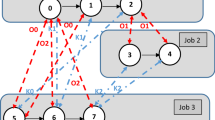Abstract
This article addresses a job-shop scheduling issue for a high-variety, low volume case organization ‘ABC’. The present scheduling of organization demands frequent changeovers and puts an additional demand for highly skilled labor and high quality work centers to reduce machine breakdowns. This makes scheduling of the jobs and allocation of resources most trivial. Moreover, the manufacturing scenario of any production system changes continuously as machine breakdown or sickness of workers is a very common issue for reduced production rate. This forces make-to-order company to reduce make-span of its products through better scheduling. This paper is an attempt to demonstrate the application of two heuristic approaches (‘Palmer’s Heuristic Approach’ and ‘Two Machine fictitious Rule’) for the job-shop scheduling problem of a case organization ‘ABC’.


Similar content being viewed by others
References
M. Ali, A heuristic n-jobs/m-machines scheduling algorithm. Comput. Ind. Eng. 17, 359–365 (1989)
M. Campbell, S. Dudek, K. Smith, A heuristic n-jobs/m-machines scheduling algorithm. Expert Syst. Appl. 64, 213–219 (1970)
I.G. Drobouchevitch, V.A. Strusevich, Two stage open shop scheduling with a bottleneck machine. Eur. J. Oper. Res. 128, 159–174 (2010)
Y.C. Eric, H. Saw, An effective heuristic on dynamic job-shop scheduling problem and comparison of different sequencing rules under dynamic condition. Artif. Intell. Eng. 54, 840–849 (1996)
R. Gangadharan, C. Rajendran, Heuristic algorithms for scheduling in the no-wait flow shop. Int. J. Prod. Econ. 32, 285–290 (1993)
M.R. Garey, D.S. Johnson, R. Sethi, The complexity of flow shop and job shop scheduling. Math. Oper. Res. 1, 117–129 (1976)
G. Ginzburg, K. Landsman, A heuristic applied for job-shop scheduling with random operations and different priorities. Int. J. Prod. Econ. 43, 215–229 (2005)
M.S. Jayamohan, C. Rajendran, Development and analysis of cost-based dispatching rules for job shop scheduling. Eur. J. Oper. Res. 157, 307–321 (2004)
S.M. Johnson, Optimal two and three stage production schedules with setup times included. Naval Res. Quart. 132, 61–68 (1954)
T. Kis, Job-shop scheduling with processing alternatives. Eur. J. Oper. Res. 151, 307–332 (2003)
G. Moslehi, M. Mahnamn, A Pareto approach to multi-objective flexible job-shop scheduling problem using particle swarm optimization and local search. Int. J. Prod. Econ. 129, 14–22 (2011)
D.S. Palmer, Sequencing jobs through multi-stage process in the minimum total time. Oper. Res. Quart. 16, 101–107 (1965)
D. Pham, A. Klinkert, Surgical case scheduling as a generalized job shop scheduling problem. Eur. J. Oper. Res. 185, 1011–1025 (2010)
R. Radharaman, A heuristic algorithm for group scheduling. Comput. Ind. Eng. 11, 204–208 (1986)
R. Ramasesh, Dynamic job-shop scheduling. Comput. Oper. Res. 18, 43–57 (1997)
S. Sarin, M. Lifoka, Scheduling heuristic for the n-job m-machine flow-shop. Int. J. Manag. Sci. 21, 229–234 (1993)
S. Shukla, M.K. Tiwari, Y. Jun Son, Bidding Based Multi-agent System for Integrated Process Planning and Scheduling. Int. J. Adv. Manuf. Technol. 38, 163–175 (2008)
S.M.A. Suliman, A two-phase heuristic approach to the permutation flow-shop scheduling problem. Int. J. Prod. Econ. 64, 143–207 (2000)
J. Sun, D. Xue, A dynamic reactive scheduling mechanism for responding to changes of production orders and manufacturing resources. Comput. Ind. 46, 189–207 (2001)
G. Vancheeswaran, A. Townsend, A heuristic of scheduling the job-shop for minimum make span. Int. J. Prod. Econ. 21, 456–472 (1993)
V. Vinod, R. Sridharan, Scheduling a dynamic job-shop production system with sequence dependent setups. Robotics Comput. Integr. Manuf. 24, 435–449 (2008)
X. Wang, M. Wang, J. Wang, Flow shop scheduling to minimize makespan with decreasing time-dependent job processing times. Comput. Ind. Eng. 60, 840–844 (2011)
T.N. Wong, C.W. Leung, K.L. Mak, R.Y.K. Fung, Dynamic shop-floor scheduling in multi-agent manufacturing systems. Expert Syst. Appl. 31, 486–494 (2006)
G. Zhang, X. Shao, L. Gao, An effective hybrid particle swarm optimization algorithm for multi-objective flexible job-shop scheduling problem. Comput. Ind. Eng. 56, 1309–1318 (2009)
Y. Zhang, H. Chen, A knowledge based dynamic job scheduling in low-volume/high- variety manufacturing. Artif. Intell. Eng. 13, 241–249 (1999)
Author information
Authors and Affiliations
Corresponding author
Rights and permissions
About this article
Cite this article
Kashyap, S.K., Thakkar, J. Job-Shop Scheduling in a Make-to-Order Company: An application of ‘Palmer’s Heuristic Approach’ and ‘Two Machine Fictitious Rule’. J. Inst. Eng. India Ser. C 93, 103–109 (2012). https://doi.org/10.1007/s40032-011-0003-z
Received:
Accepted:
Published:
Issue Date:
DOI: https://doi.org/10.1007/s40032-011-0003-z




